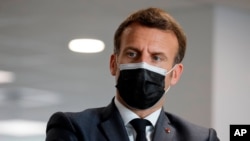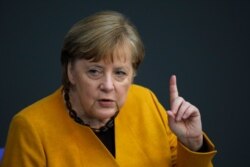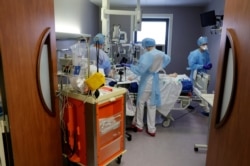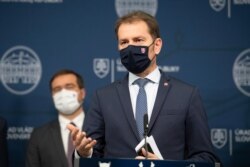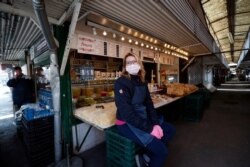European leaders are handling rising public frustration, economic distress and mounting coronavirus case numbers in different ways, with most showing the strain of dealing with a yearlong pandemic, say analysts and commentators, who add that the leaders seem to be rattled by a third wave of infections sweeping the continent.
A defiant French President Emmanuel Macron defended his decision to avoid a lockdown as the infection rate climbed in January, telling reporters last week he had “no remorse” and would not acknowledge any failure for the deepening coronavirus crisis engulfing France.
“There won’t be a mea culpa from me,” said Macron.
In Germany, Chancellor Angela Merkel last week apologized to Germans for her initial decision — now rescinded — to lock the country down tight for Easter. She called the idea a mistake and apologized after a hastily arranged videoconference with the country’s 16 state governors.
But she urged fellow Germans to be more optimistic and stop complaining about restrictions and vaccine delays.
“You can’t get anywhere if there’s always a negative,” she said. “It is crucial whether the glass is half full or half empty.”
Merkel has likened the third wave of rising coronavirus infections to “living in a new pandemic” and encouraged Germans to test themselves once a week with rapid tests provided by authorities.
In France, medical directors from the Paris public health system warned in a statement to Le Journal du Dimanche newspaper that soaring infections are overwhelming the capital’s hospitals. As in Bergamo, Italy, a year ago, they say medical staff will soon have to choose which patients to treat.
“We’re going straight into the wall,” said Catherine Hill, an epidemiologist in France. “We’re already saturated, and it’s become totally untenable. We can no longer take in non-COVID patients. It is completely mad,” she told French radio.
France’s Health Ministry reported 37,014 new coronavirus cases Sunday, bringing the country’s total number of infections to over 4.5 million. Over 94,000 people in the country have died from the virus.
Across Europe, 20,000 people are dying per week, more than a year ago, according to the World Health Organization (WHO). WHO has urged governments to get back to basics in their handling of the pandemic. Central Europe, the Balkans and the Baltic states are also being hit hard with cases, hospitalizations and deaths — among the highest in the world.
Political repercussions
The pandemic has claimed two political positions, as well. The coalition government in Italy headed by Giuseppe Conte collapsed last month amid a dispute about how to spend European Union recovery funds.
On Sunday, embattled Slovak Prime Minister Igor Matovič announced his resignation to end a monthlong political crisis sparked by his decision to buy the Russian-made Sputnik V vaccine to make up for a shortfall in vaccines distributed by the EU.
Matovič will switch places with current Finance Minister Eduard Heger, who will become the new prime minister of the fractious four-party coalition government.
Under public pressure to get a grip on the crisis, some leaders appear to be increasingly nervous about the possible electoral repercussions from more lockdowns, deaths and likely more months of reduced economic activity, which means more bankruptcies.
According to a pan-Europe opinion poll conducted for the International Republican Institute, a U.S.-based NGO in partnership with European parliamentary groups, Europeans, especially in the East and center of the continent, are becoming increasingly gloomy about their economic prospects. Pessimism is especially pronounced among low-income Europeans.
More than 40% of respondents from Hungary, Slovenia, Bulgaria, Italy, Romania, Poland and Spain told pollsters they feel their financial situation will get worse. With the gloom mounting, governments appear to be lashing out, according to some commentators, with efforts being made to find scapegoats for the worsening crisis.
British officials argue that the ongoing dispute between Britain and the EU over supplies to Europe of the AstraZeneca vaccine are part of an effort to shift blame. The EU claims it is not getting a fair share of doses, thanks to behind-the-scenes British shenanigans — an accusation London vehemently denies.
The British media have also lambasted European leaders for what they say are false accusations, with Macron being seen as largely behind the distraction.
“There is now a systematic attempt by his (Macron’s) entourage to blame the unfolding debacle on the British, trying to create a sense that everything would be on track were it not for the U.K.’s refusal to hand over AstraZeneca vaccines,” said British columnist Ambrose Evans-Pritchard.
Policy U-turns are coming thick and fast — another sign of political disarray, analysts say.
Merkel on Sunday — just days after relenting on a tight Easter lockdown — blamed regional governments for failing to take the crisis seriously enough and for easing restrictions despite rapidly rising infection rates.
She threatened to centralize Germany’s pandemic response and override regional powers, a move that would be legally and politically risky and would undermine traditional German federalism.




